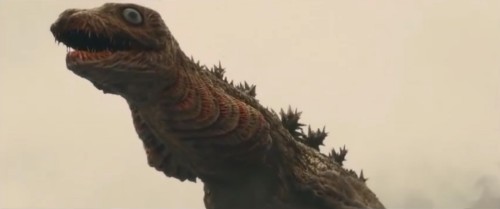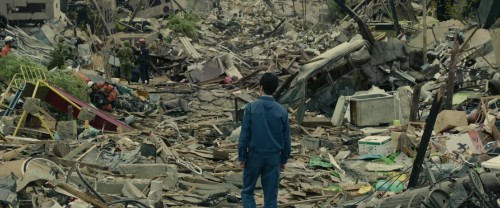
Bureaucracy and destruction run rampant in Hideaki Anno’s revamp of the beloved franchise.
“On Ohdo Island, where he’s from, it means ‘God incarnate’.”
Godzilla is whatever you make of him. In some instances, he’s a force of nature and the result of man’s folly. In others, he is a bleak reminder of the terror we are capable of inflicting on each other. Other times, he is a superhero defending the earth from an endless string of identically-sized monsters with distinct cries. In his latest adventure, director Hideaki Anno brings him back to that of an unstoppable creature of absolute horror.

Shin Godzilla, or Godzilla: Resurgence depending on your market, focuses on the Prime Minister of Japan and the National Diet as a giant, slithering lizard comes ashore in Tokyo and causes mass destruction and panic. With seemingly endless red tape to navigate, Deputy Chief Cabinet Secretary Yaguchi (Hiroki Hasegawa) tries to assemble a task force together to better understand the enemy. Meanwhile, the US is planning more violent assaults on the creature, which they start calling Godzilla. And as the monster begins to evolve and tear his way through the city, Yaguchi fights the bureaucrats and their endless debates, desperate to find a solution that doesn’t involving exploding the whole city.

And oh man is there a lot of democracy here. While it’s not uncommon to find, in previous entries, plenty of scenes involving humans wondering what to do, Shin Godzilla goes one step further, showing us just how the government’s actions can affect the populace. This is a film where blue collar workers and the citizens of Tokyo die while men in suits struggle to come to a single conclusion, instead choosing to have meeting after meeting. Godzilla’s relevance in the movie is not directly tied to one disaster, the way that the United States’ nuclear bombs inspired the original, but rather the real-world parallels come from the government response to the monster, echoing criticisms of the lack of action following the 2011 Tohoku earthquake.

But there’s another reason people come to see a Godzilla film, and that’s for the destruction, and oh boy does this movie deliver. Right from the get-go, proto-Godzilla crawls out of the ocean and leaves a trail of carnage in his wake – and there are some great shots of the monster attempting to pass through tiny rivers, causing an avalanche of fishing boats as he goes, and that’s only the creature in his most basic form. Once he starts evolving, we really get a sense of scale of how massive this version is (the biggest since his incarnation 60+ years ago). He disappears for some time and upon his return, the terror gets scaled up by ten, with the King of Monsters tearing his way through Tokyo like it was made from crepe paper.

And then the atomic breath comes. I won’t ruin it for you, but it’s even better than when he vomits down a MUTO’s neck, or that time he used it to fly. I don’t want to go on too long here, but this is one of the reasons why this is one of the best Godzilla films in forever: he’s here, in the heart of the city, and he is an absolute force of nature. What makes it such a powerful version is that Godzilla as shown here is a creature who adapts and evolves, to stay alive, and every attempt to knock him down only results in him growing stronger and deadlier. And these scenes matter, as the movie’s goal here seems to be to make Godzilla feel like a legitimate threat again.

He hasn’t been a villain in the Japanese films for some time, usually facing off against threats bigger and scarier than he (and he wasn’t even one in Gareth Edward’s film either), so it’s great to see him lay waste to entire districts with a single belch of his destructive breath. Like they say in the film – he is the wrath of god incarnate, and it takes some of the best minds in the world to figure out how to stop him. But his constant evolution makes the characters’ job an almost impossible task and also gives us some fascinating new lore about the monster, right down to the intriguing final shot right before the end credits. Godzilla is fleshed out in a way that suggests there’s a lot more to the story than we’re shown, and it’s going to be great to see where it goes from here.

With all of this praise on the monster, it naturally is a bit of a shame when we cut back to the government officials, especially during the second act. Things slow down dramatically here, but you know they’re building to something good so it’s worth sticking around for. There are moments, especially in the beginning, when the sheer volume of names and on-screen text can be overwhelming (especially with subtitles!), but I suppose that’s part of the message. There are dozens and dozens of people in power, yet none of them seem to matter and barely any of them get anything done. Still, I can definitely imagine a large amount of people would rather we see more monster action and this film might disappoint in that regard.

Nevertheless, Shin Godzilla gives us an excellent version of the monster, a great, politically-relevant message with some excellent visuals to boot. The faults – some of the effects aren’t much better than 2004’s Final Wars, and some scenes can drag right the hell on – are outweighed by the great moments, and ultimately, Shin Godzilla is likely exactly what you’ve been looking for in the series.
Verdict: By ignoring Godzilla’s heavy history, Toho are able to revamp him and make him a real, terrifying monster again.

Overall entertainment: 8/10
Violence: If it moves, it can be incinerated
Sex: Possible asexual reproduction/10
Godzilla action: 9/10
Meetings: Hundreds!
Cameos: More than there are main characters
Lasers: An entire 80s animated show’s budget’s worth
Godzilla’s stubby little arms: About as stupid as they look in the trailer
———-
Shin Godzilla (2016)
Also known as: Godzilla: Resurgence, シン・ゴジラ
Japanese, English
Directors: Hideaki Anno, Shinji Higuchi
Writers: Hideaki Anno
CAST
Hiroki Hasegawa – Rando Yaguchi
Satomi Ishihara – Kayoko Patterson
Yutaka Takenochi – Hideki Akasaka
Mikako Ichikawa – Hideki Akasaka
Takumi Saito – Ikeda
Kengo Kora – Yuske Shimura
Kimoko Yo – Reiko Hanamori
Ren Osugi – Prime Minister Okochi
Akira Emoto – Ryuta Azuma
Jun Kunimura – Zaizen
Pierre Taki – Saigo
Shinya Tsukamoto – Biologist

